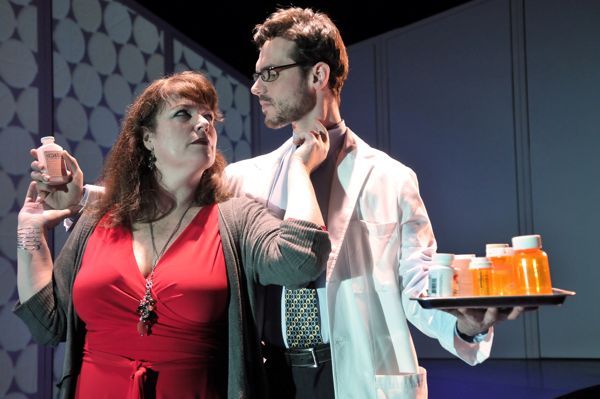
A woman (Kerry A. Dowling) fantasizes about her psychopharmacologist (Chris Caron) in a scene from the SpeakEasy Stage Company production of Next to Normal, running now thru April 15th at the Stanford Calderwood Pavilion at the Boston Center for the Arts, 527 Tremont Street, in Boston’s South End. Tix/Info: 617-933-8600/www.SpeakEasyStage.com. Photo: Craig Bailey/Perspective Photo.
Next to Normal; Music by Tom Kitt, Book and Lyrics by Brian Yorkey, SpeakEasy Stage Company, Boston Center for the Arts Roberts Studio Theatre, 3/9/12- 4/15/12, EXTENDED THROUGH 4/22/12 (Second and Final Extension)!!! http://www.speakeasystage.com/doc.php?section=showpage&page=normal.
Read Rebecca’s interview with Kerry Dowling here.
Reviewed by Craig Idlebrook
(Boston, MA) Break a toe and you might end up with a sore back. Twist an ankle and your knee might have trouble compensating. A family is like that. It is a group of humans that moves in concert and is much more adaptable than a body, for better or worse. When a part of the social organism is injured, the other parts imperfectly try to take up the load. What else can you do, amputate?
Speakeasy’s production of Next to Normal provides a clear window into the holistic impact the mental illness of one member of the family has on the family-body. It realistically and powerfully illustrates how we all soldier on when there are pieces of us missing. But this isn’t an “Eat-Your-Vegetables-and-Learn-About-Mental-Illness” production. Next to Normal provides pitch-perfect comedic timing, layered action, great music and a stunning set. Life flows through this play; though it is heartbreaking, it is not a requiem. Tissues are a must, however.
Diana (Kerry A. Dowling), unable to deal with a loss, is coming unhinged, again. Her family knows the drill. She and her husband, Dan (Christopher Chew) have sought treatment for years for her mental illness, which ranges from bipolar disorder to schizophrenia. Dan is trying to hold the marriage together with pure stoicism, too afraid of letting it fail. Their children, Gabe (Michael Tacconi) and Natalie (Sarah Drake), each must grapple with their distracted parents, both yearning for love and connection, but knowing there is only so much focus to go around. Despite their best efforts, everything is unraveling at the seams. (Reader Warning: I’m fudging this synopsis just a smidge to not give away the play. Deal with it.)
First and foremost this is a brilliant play powered by great acting. You know the acting is good when the cast keeps layers of their characters in reserve to reveal as the play goes on. Chew creates a flawed hero as the husband who soldiers on, allowing us just glimpses of pain in his character’s neutral face. And never has teenage sarcasm said so much as the one-liners delivered by Drake’s Natalie; if there’s one flaw in this play it’s that the script never gives us enough time to watch her own descent. But you will not find a clunker of a performance in the bunch; everyone is fleshed out, even when they are delusions.
The music is equally powerful, if a little reminiscent of Rent. The score and lyrics seem not designed to be stand-out pop songs, but instead they offer complex layers of action, intense rounds and competing truths. It’s the kind of music that is good to hear the first time, but can only be fully appreciated with several listens. The set also is breathtaking in its simplicity, a layer of panels with projected images that follow the action and the moods of the actors. At times, the design distracts a bit, as you can tune out and follow the hands moving the panels if things get too intense on stage, but at most points the set acts as an minimalist extension of the scene, as if a character’s emotion pours out onto the panels.
In addition to being a great play, Next to Normal does a fine job offering a nuanced picture of the human cost of mental illness. (We have come a long way from my school days, when mental illness was covered in health class with a movie of the week where James Woods starts screaming in the mud and James Garner institutionalizes him.) The mentally ill rarely tune out or stop trying; sometimes, they just lose their way. It is a chronic condition, this play illustrates, one that leaves no one in its orbit unchanged.
